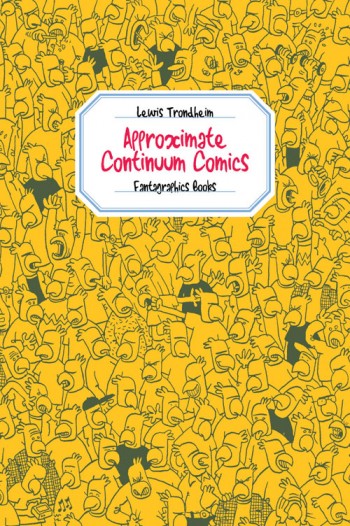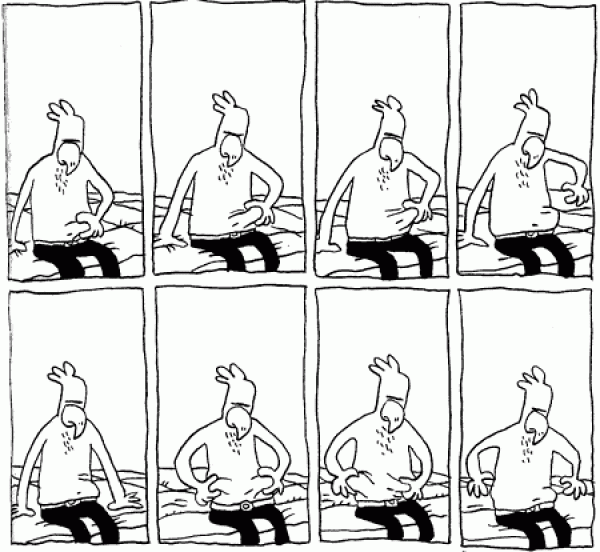 Home > CR Reviews
Home > CR Reviews Approximate Continuum Comics
posted May 23, 2011
Approximate Continuum Comics
posted May 23, 2011

 Creator:
Creator: Lewis Trondheim
Publishing Information: Fantagraphics, softcover, 160 pages, 2011, $18.99
Ordering Numbers: 9781606994108 (ISBN13)
It's worth noting, I think, that the comic books collected into
Approximate Continuum Comics were published in 1993 and 1996 when its author, Lewis Trondheim, was on either side of 30 years old. Disregard every other possible entry into them -- as informal history of modern French comics, as a milestone in Trondheim's development, as a smart and urbane take on the 1990s autobiographical trend -- the comics in
Approximate Continuum constitute a highly amusing portrait of that mostly under-explored time in a person's life when things become more important and more ridiculous in equal measure and we find ourselves constantly and even quietly adjusting to wholesale changes in life and attitude and orientation that we once had hopes to master. It speaks to how well-observed the book is that you could pick it up sans context of any kind and find much to enjoy.
It's not that the life Trondheim describes relates to most of our own in the broad strokes. Almost none of us reading this work were anything like Trondheim at that age, of course, about to make the move from rising cartoonist of interest to outright industry superstar. Nor did all of us suffer the disruptions at work or the severe changes in personal life -- wife! child! house! -- Trondheim unpacks in generous, humorous detail. And yet it's hard to imagine not connecting with
something here. My memory of reading this work in French is caught up in some of the showier narrative choices: the way that his fictional comics bleed into whatever he's saying about himself in certain moments, or the way he creates multiple avatars of himself with which to debate various significant issues. In English, these comics seem more like an army of quotidian details passing through a very personal Red Square, barely pausing to salute. We see Trondheim scrambling to keep a party going while a few out-sized personalities try to bring it down -- and then laughing despite himself at their later, anecdotal misfortunes. We witness our narrator coolly trying to engage someone proselytizing in his direction only to not-so-coolly blow up about two exchanges in and having to be walked and talked away by a close friend. We are given access to Trondheim's inner thoughts during a spectacularly annoying L'Association meeting. We see the author becoming enraged out of all proportion at very specific and tiny injustices, such as the way a certain class of subway-goer bends the rules to the cartoonist's detriment. We watch as Trondheim obsesses to the point of shutting down over something in a specific process (making a holiday card) rather than what that process is designed to do for us (wished our loved ones a happy holiday).
Trondheim pulls off the rare feat in
Approximate Continuum Comics of using a creative strategy designed to foster spontaneity (we learn that the work is created quickly, that he doesn't keep notes even when they might have been a good idea, and that there is little to no effort in double-checking with people to figure out the most accurate version of reality before the comics are made) to
strengthen the disconnect that exists between reality and art rather than, to mix metaphors, knock down any walls that might exist between them. It's as if Trondheim is so deeply and naturally conflicted about so many things that just getting the work down at all costs shoves that aspect of his personality to the front of the page. In the book's very first scene, Trondheim complains about his lack of artistic chops on a page bursting with an energy that lies far beyond the skill set of the vast majority of working cartoonists. The wonderful churn of the book arises from the fact that Trondheim is absolutely aware of this but is also quite honestly lacerating in the implied criticism of striking that pose. It makes him, perhaps ironically, very good company. A meditation on accidental progress that manages to foreshadow both the tightly-wound "At Loose Ends" and the marvelously freewheeling
Little Nothings books,
Approximate Continuum Comics consistently hits the pleasure points afforded by great cartooning and a wicked sense of humor, and should be fair comfort to anyone that feels they're at a point in their life when they need to give themselves a good talking-to.



